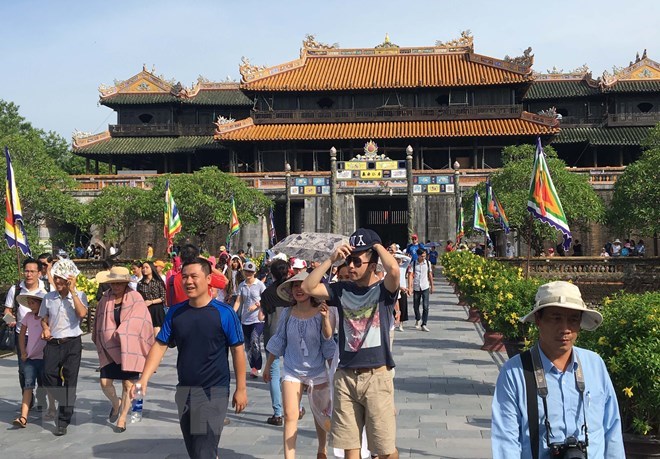
The Hue ancient citadel relic complex – a UNESCO World Cultural Heritage site – will be open with free admission for domestic visitors during the first three days of the 2019 Lunar New Year (February 5-7).
![]()

At Hue
ancient citadel relic complex (Source: VNA)
Holidaymakers
to the Hue ancient capital city on those days will have a chance to participate
in royal games and enjoy calligraphy and martial arts performances, along with
traditional dragon and lion dances.
As part of activities welcoming the arrival of Tet, the biggest and most
important festival year-round in Vietnam, the Hue Monuments Conservation Centre
will re-enact the Neu tree planting ceremony, a traditional ritual practised
under the Nguyen Dynasty (1802-1945) on January 28 (the 23rd day of the last
lunar month).
There will also be an array of activities such as wrapping chung cake (a
traditional Tet novelty cake made from glutinous rice).
In 2018, the Hue Monuments Conservation Centre earned 381.7 billion VND (16.4
million USD) from serving over 3.5 million tourists, up 19 percent compared to
the target set.
The centre has implemented 24 restoration projects with total investment
exceeding 278.8 billion VND (11.9 million USD).
Hue, the formal imperial capital of Vietnam for hundreds of years, is home to
five heritages recognised by UNESCO, including the ancient citadel relic
complex (a World Cultural Heritage site), Hue royal court music (an intangible
cultural heritage item), Nguyen Dynasty’s wood blocks (a documentary heritage
item), Nguyen Dynasty’s royal administrative documents (part of the
Asia-Pacific Register of UNESCO’s Memory of the World Programme), and
literature on Hue royal architecture (another documentary heritage).
The Hue imperial citadel relic site has been ranked second among the top seven
tourist attractions of Vietnam in 2017.
Source: VNA
Spanning thousands of hectares and winding gracefully along mountain slopes, hillsides, and riverbanks, the terraced rice fields of Lac Son District present a stunning and captivating beauty. This region, renowned for its remarkable terraced landscapes, is also the centre of Hoa Binh Culture known for numerous archaeological sites.
The life of Mong people in Hang Kia and Pa Co communes of Mai Chau district has improved much thanks to tourism development.
The man-made Hoa Binh Lake, with a water surface area of approximately 9,000 hectares and a capacity of 9.45 billion cubic meters, stretches over 200 kilometers from Hoa Binh to Son La provinces. With the goal of developing into a national tourism area, the Hoa Binh Lake tourism area is expected to not only become the largest tourism centre in the province but also one of the 12 key tourist destinations in the northern midland and mountainous region of Vietnam.
Da Bia hamlet, now Duc Phong, in Tien Phong commune, Da Bac district, was once almost isolated from the outside as the only way to the hamlet was to get a boat ride across the Hoa Binh reservoir. However, as its tourism potential has been unleashed, the hamlet has established itself as one of the most attractive destinations on the tourism map. It has even received the ASEAN Community-Based Tourism Awards in 2019.
In the first 9 months of 2024, Mai Chau district, Hoa Binh province welcomed over 684 thousand visitors to visit and relax. In which, over 516 thousand domestic visitors and more than 168 thousand international visitors. Total revenue from tourism is estimated at over 821 billion VND.
Da Bac district, bestowed with stunning landscapes, is developing ecological and resort tourism offerings. Several tourist sites, put into operation this year, has attracted throngs of high-spending and young domestic visitors.



